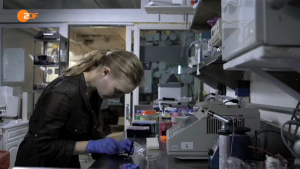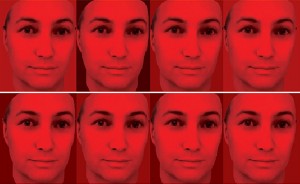Heather Dewey-Hagborg Conversation
A month or two ago I talked about a disconcerting art show that hit the world a little while ago. The artist was someone by the name of Heather Dewey-Hagborg and the show was the epitome of controversial. Basically Heather would take found DNA and then she would reconstruct the individual’s faces and then post on the gallery walls the re-constructed faces. I went a little ape as I imagined all of the potential implications. And so I emailed Heather and told her so! hahah. Here is the full exchange that we had over the past month or so.
Here is the complete email that I sent to Heather initially:
Hey there Heather,
I recently ran across your latest project, Replace, which introduced me to your previous project, Stranger Visions, which blew my mind. I do not fashion myself as a security freak, or an alarmist, but this piece definitely struck a chord for me. Could a stalker snag a hair and create a life size, full body duplicate of their target? Apparently. Or, what about just selected parts? Or organ duplicates? Just gave me pause. Not in a bad way, just in a, wow… the world of technology and science. Not only could my identity be hacked, but my genomes could be hacked to. What about custom built virii targeted to one victim? Wow.Anyway, I did a really short piece kind of thinking out loud about your art and your work, but I may have done it a disservice. I thought maybe I should do a follow up and give you a moment to talk to the work. So that end, maybe you would be open to answering a couple questions to include in the piece? I will pull heavily from your press piece, so the heavy lifting is already done, but I thought it might be nice, if you had a moment you could answer a couple quick questions? If not, no worries at all.
And thanks for pushing the envelope in the art/science worlds.
Taylor
Heather’s response was pretty inquisitive about the piece I’d written about her work, and while I was glad that she responded, I still wasn’t sure she’d actually talk me through it.
Hi Taylor,
That’s interesting – I haven’t read your piece (I don’t believe) but what makes you think it was a disservice? Anyhow, sure I’m always happy to discuss, the work after all is about provoking these conversations!thanks,
Heather
And so I let her know about the initial piece that I’d written and where she could find it:
Hey there Heather,So after posting it and thinking about it some more I sort of realized that the work was probably all about raising awareness and creating a conversation (as all good art does.). Here’s the piece.What really got me was this – who’s to say you didn’t choose to post my face if you found my DNA. What if you’d chosen my, shall we say, unmentionables? Or worse? With the DNA in my hair you could just post a file of my health issues, AIDS, Cancer potential, actuarial mortality rate. Worse yet, you could broadcast online everything but my name. But maybe if we figured out how to make fingerprints you could. Right?I work in IT and am similarly shocked by how much I can dig up on people online and how little people realize this. So I guess I could do a similar thing that would blow people’s minds… But of a different sort. I guess these aren’t questions. But am just sort of digesting your art and what it means to society. But I figured I should probably hear from the horse’s mouth herself before I actually convict you of something your weren’t intending to do or say. But it is rather amazing the reaction I have had to it seeing as though I really don’t care much about online privacy knowing the futility of it. But this is definitely doing something totally different in my head.Regardless, thanks for responding and maybe I’ll pull myself together enough to ask a proper question or two. But there is plenty to respond to in my small post about your art and my write up as well.Taylor
I think that your reaction is exactly the point of the work – it is meant as a prompt, to make people think about how much incredibly personal information they are shedding all the time. It is meant to ask what might it mean to enter an era of mass genetic surveillance?
This is exactly what it is about.Heather
That is what I assumed. I figured I completely got what you are trying to do.
But the question I have is maybe a little more complicated than just that. It reminds me of the controversy back in 1995 around Tom Clancy and one of his books when he wiped out 97% of the representatives of Government by having terrorist hit a joint session of congress with a passenger plane. Obviously that was seven years before 9/11. At that point no one really was thinking about planes as weapons. But it put the idea into the general public awareness. Could we blame Clancy for 9/11 a little now? I’m obviously not. But there is a flow of causality there. A butterfly effect if you will.Has anyone said to you – you have brought this idea into the public mindset, do you bare any blame for future harm? I guess that is a better question to ask the scientists and the technology. But you have single handedly made this a known fact, it would seem. We are aware now of what is possible. I could recreate your prints and crack a safe with them… steal from a bank. Better yet, I could put your DNA all over a knife I kill someone with. Your generated blood even. Have you been challenged by people that are threatened by your work and what it means for society today?I actually love your work… or I wouldn’t be grappling with it. I personally think that “Art” that doesn’t challenge us isn’t really art at all. And if that is the measure of ART-ness, then your work definitely is the epitome of art. I think of Banksy, and how most art critics don’t believe his work to be art… and yet, his social commentary is some of the most insightful and poignant works out there today. So, kudos to you for breaking my brain and causing me to think.I appreciate your taking the time out to respond. You have definitely been very gracious with your time
First of all in my opinion it is always better to know something is possible than to hide knowledge away out of fear.
Second of all what you describe is basically an exploit, a hack, an exposure of a security vulnerability. So the counter argument is that knowing about these vulnerabilities allows us to prepare for them. ie. you 911 example.This is speaking generally. From my perspective on my work specifically, I think the public *should* know what scientists are working on behind closed doors (phenotyping) and I think we all need to know if DNA is not the gold standard we trust it to be.So yeah, knowledge over fear.



 I think that your reaction is exactly the point of the work – it is meant as a prompt, to make people think about how much incredibly personal information they are shedding all the time. It is meant to ask what might it mean to enter an era of mass genetic surveillance?
I think that your reaction is exactly the point of the work – it is meant as a prompt, to make people think about how much incredibly personal information they are shedding all the time. It is meant to ask what might it mean to enter an era of mass genetic surveillance?